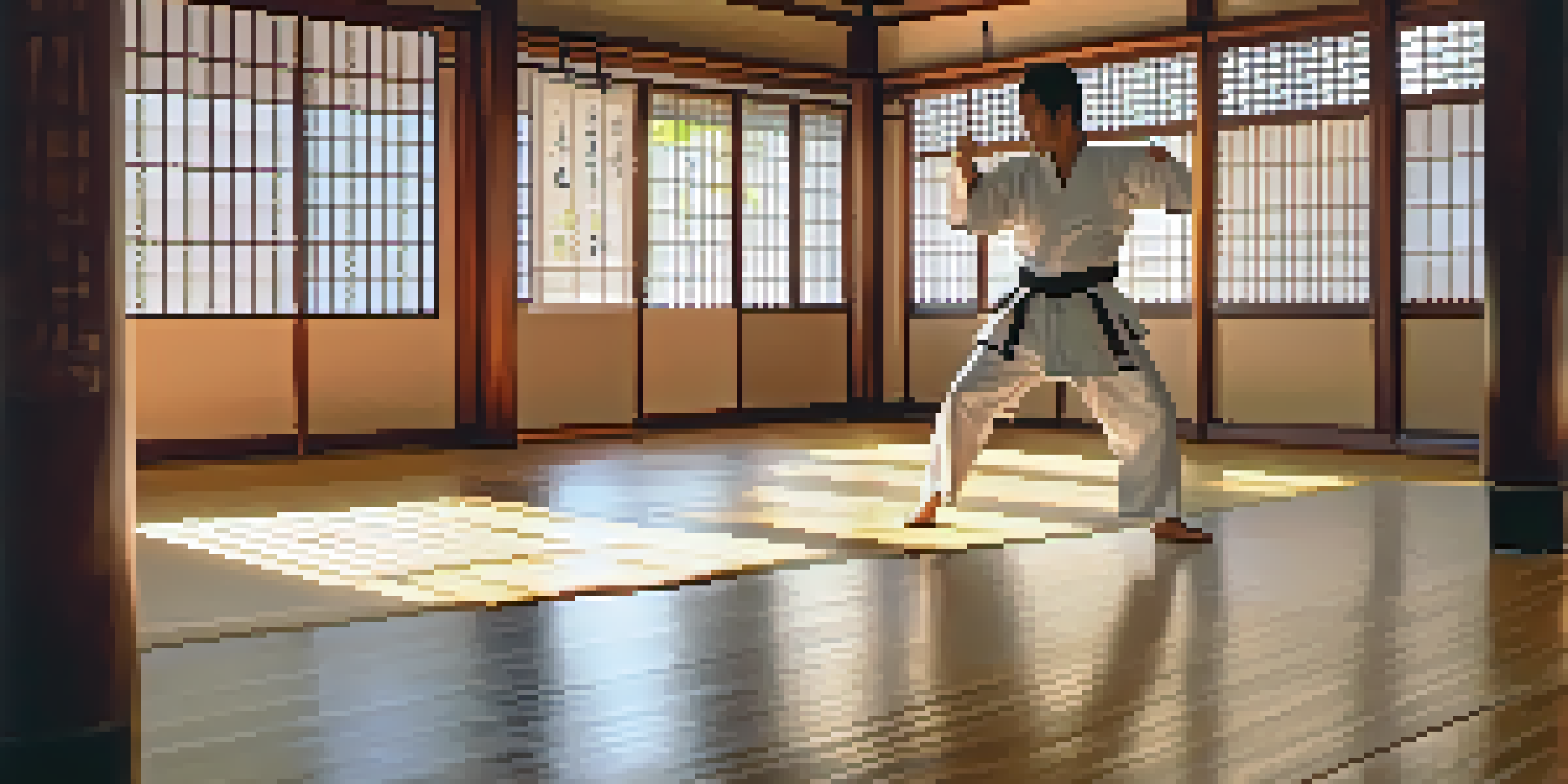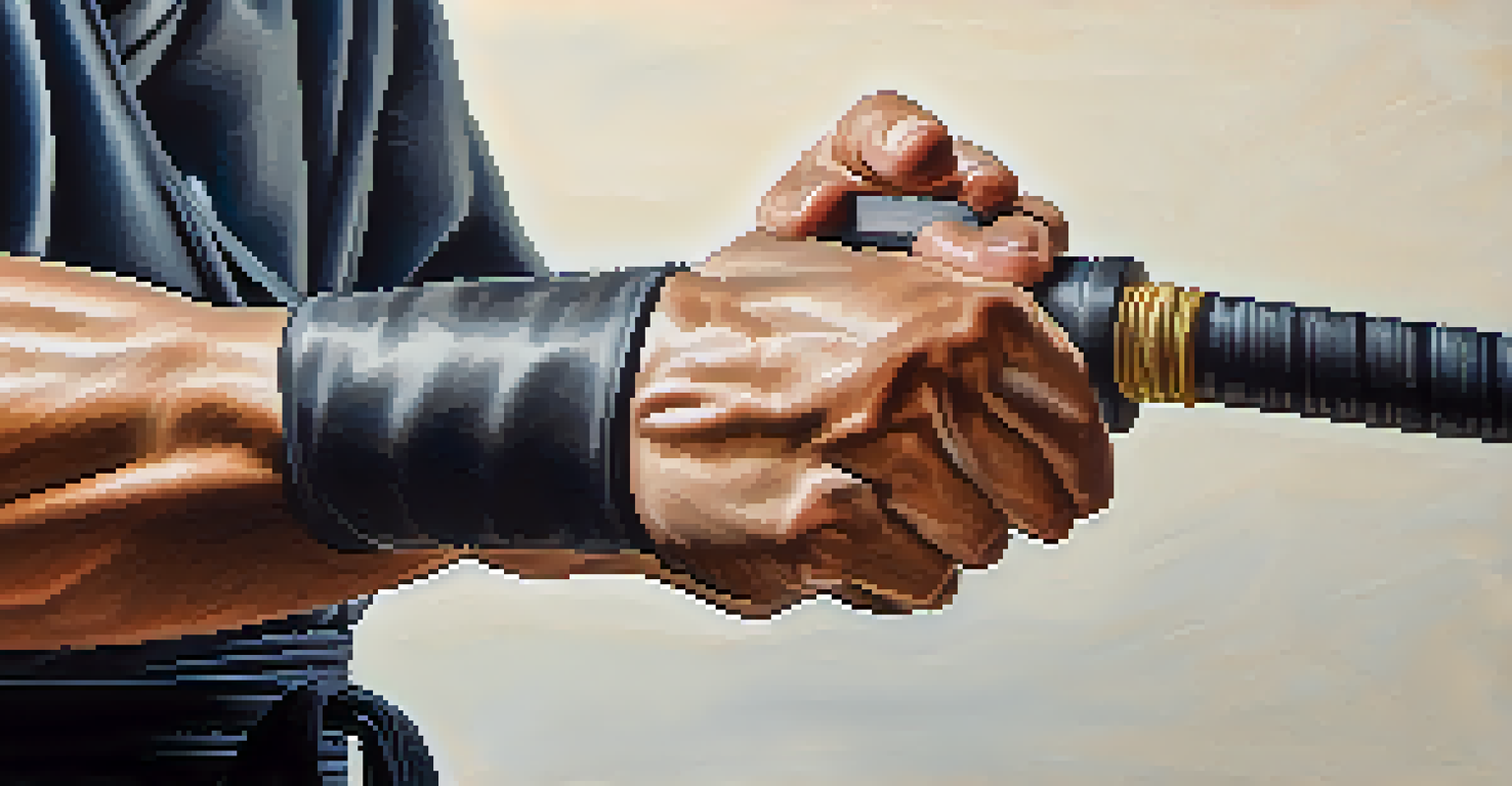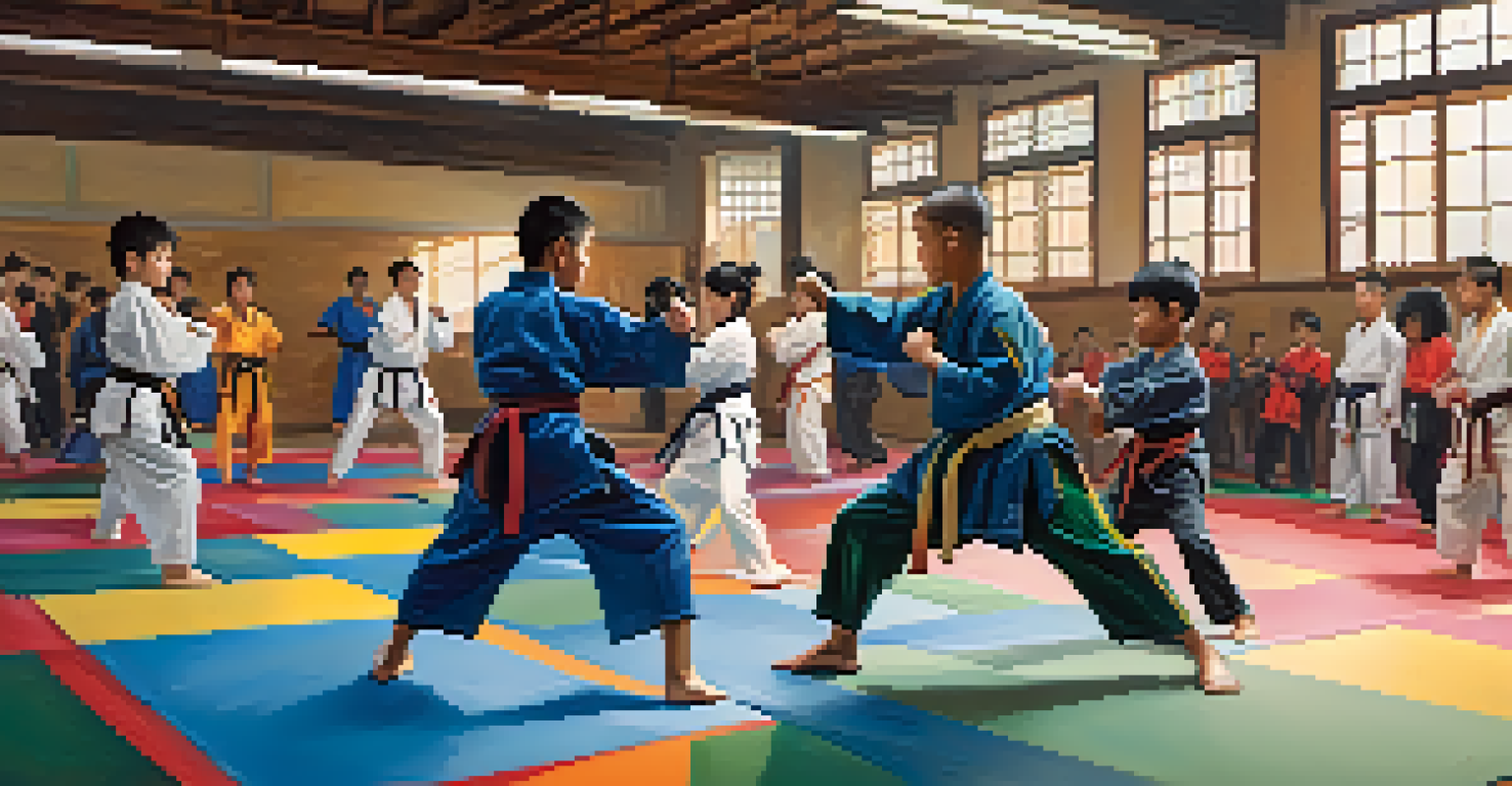Martial Arts and Its Role in Overcoming Fear and Anxiety

Understanding Fear and Anxiety in Daily Life
Fear and anxiety are natural responses to stress, often creeping into our daily lives when we least expect it. They can manifest in various forms, from a nervous feeling before a big presentation to overwhelming dread that stops us in our tracks. Understanding these emotions is the first step toward managing them effectively. By acknowledging their presence, we can start to explore ways to cope, and that’s where martial arts come into play.
Courage is not the absence of fear, but the triumph over it.
Many people experience anxiety in social situations or when facing new challenges. This can lead to avoidance behaviors, which only reinforce the cycle of fear. Imagine feeling anxious about speaking in public; instead of confronting that fear, you avoid the situation entirely. This avoidance might provide temporary relief but usually makes the anxiety worse in the long run. Martial arts training encourages you to face your fears head-on, helping to break that cycle.
Moreover, martial arts teaches us that fear is not inherently negative; it can be a signal to pay attention and prepare ourselves. Just like a fire alarm warns us of potential danger, fear can alert us to situations that require caution. However, understanding and managing that fear allows us to channel it productively, which is a fundamental lesson imparted through martial arts practice.
The Discipline of Martial Arts Training
Martial arts requires discipline, which can be a powerful antidote to anxiety. When you commit to a regular training schedule, you cultivate a sense of routine and control over your environment. This structure can provide a comforting anchor amidst life’s unpredictability. For instance, knowing that you’ll attend a class every Tuesday and Thursday gives you something to look forward to, creating a sense of stability.

As you progress in your training, you also develop the discipline to face discomfort. Sparring with a partner or executing challenging techniques pushes your boundaries, teaching you to stay calm under pressure. This experience can translate to real-life situations where anxiety might otherwise take hold. For example, the confidence gained from successfully executing a complicated move can empower you in high-pressure situations outside the dojo.
Martial Arts Manage Anxiety
Engaging in martial arts helps individuals confront and manage their fears, breaking the cycle of avoidance.
Furthermore, the discipline of martial arts is not just physical; it's mental as well. Practitioners learn to focus their minds, reducing the chatter that often accompanies anxiety. This mental clarity can be incredibly liberating, allowing you to tackle fears with a more grounded perspective.
Building Confidence Through Skill Mastery
One of the most rewarding aspects of martial arts is the sense of accomplishment that comes with mastering new skills. Each belt you earn or technique you perfect serves as a tangible reminder of your progress. This sense of achievement can significantly boost your self-esteem, making you more resilient in the face of fear. Imagine stepping onto the mat for the first time and gradually transforming into a more skilled fighter; that journey builds confidence layer by layer.
The only limit to our realization of tomorrow will be our doubts of today.
As you overcome challenges in training, you learn to trust yourself, which can spill over into other areas of your life. For example, the confidence gained from successfully executing a difficult kick can embolden you to approach that intimidating presentation at work. With each small victory, you reinforce the belief that you are capable of overcoming obstacles, both in martial arts and beyond.
Additionally, martial arts communities often celebrate progress together, fostering a supportive environment. Sharing your successes with peers can help diminish feelings of isolation often associated with anxiety. When you realize that others are facing similar challenges, it can be comforting, reminding you that you’re not alone in your journey.
Physical Activity as a Stress Reliever
Physical activity is a well-known stress reliever, and martial arts is no exception. Engaging your body in movement helps release endorphins, the body’s natural mood lifters. This boost in endorphins can alleviate feelings of anxiety and contribute to a more positive mindset. Think of a martial arts class as a mini-vacation for your mind—when you’re focused on the movements, you temporarily escape the worries that might be weighing you down.
Furthermore, martial arts training often involves intense workouts that can help release pent-up tension. Whether it’s through punching a bag or executing high-energy drills, you’re not just building physical strength; you’re also working through emotional stress. This release can leave you feeling lighter and more relaxed, improving your overall mental health.
Discipline Builds Confidence
The structure and discipline of martial arts training foster self-confidence and resilience in facing challenges.
Incorporating martial arts into your routine can create a healthy outlet for stress, ultimately contributing to better emotional regulation. When you have a reliable way to channel stress, it can help mitigate anxiety before it spirals out of control. This proactive approach to managing emotions can be a game-changer for many individuals.
Mindfulness and Focus in Martial Arts
Martial arts teach valuable lessons in mindfulness, which can be particularly beneficial for managing anxiety. Practitioners learn to be present in the moment, focusing on their movements and breathing. This practice shifts attention away from anxious thoughts, allowing for a clearer mind. Picture yourself in a class, fully immersed in the practice; that concentration can act as a form of meditation, grounding you in the here and now.
The emphasis on breathing techniques in martial arts further enhances this mindfulness practice. Controlled breathing can activate the body’s relaxation response, countering the physical symptoms of anxiety like a racing heart. For instance, when faced with a stressful situation, recalling the deep breathing techniques learned in martial arts can help calm your nerves, making it easier to respond effectively.
As you develop the skill to focus your mind, you also cultivate resilience against distractions and worries. This newfound ability to concentrate can be applied in everyday life, helping you tackle challenges with a clearer perspective. Ultimately, the practice of mindfulness in martial arts can empower you to face your fears with greater confidence and calmness.
Community Support in Martial Arts Training
One of the often-overlooked benefits of martial arts is the sense of community it fosters. Training alongside others creates bonds that can help alleviate feelings of isolation associated with anxiety. When you share your experiences with fellow practitioners, you realize that many of them have faced similar challenges, providing a supportive network. It’s like having a safety net that reminds you you're not alone in your struggle.
This sense of belonging can be incredibly uplifting. Celebrating each other’s achievements, whether it’s earning a new belt or mastering a technique, creates an environment of encouragement and positivity. These supportive interactions can help counteract the negative self-talk that often accompanies anxiety, replacing it with affirmations and camaraderie.
Community Supports Growth
Martial arts create a supportive community that alleviates feelings of isolation and encourages personal development.
Additionally, martial arts schools often cultivate a culture of respect and understanding, making it easier to open up about your fears and anxieties. This environment can allow you to express vulnerabilities without fear of judgment, fostering personal growth. The bonds formed in this context can serve as a valuable resource as you navigate your journey toward overcoming anxiety.
Taking the First Step: Finding Your Martial Arts Path
Starting your martial arts journey can feel daunting, especially if you’re struggling with fear and anxiety. However, taking that first step is often the most significant part of the process. Whether you choose karate, jiu-jitsu, or another style, remember that every expert was once a beginner. Finding a local class and simply observing can help ease those initial nerves, allowing you to see the community and training environment firsthand.
When selecting a martial arts school, look for one that prioritizes a welcoming and supportive atmosphere. Many schools offer introductory classes or trial periods, which can provide a low-pressure way to explore your options. It’s essential to find a place where you feel comfortable and valued, as this will enhance your experience and promote personal growth.

As you begin your training, remember to be patient with yourself. Progress may come slowly, especially when overcoming fear and anxiety, but every small step counts. Celebrate each achievement, no matter how minor, as it contributes to your overall journey toward confidence and resilience.